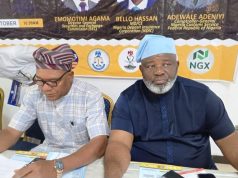Again, President Mohammedu Buhari has ordered the termination of the Water Security Contract signed between Nigeria and Israel in 2017 worth $195million.
The Contract was initiated by the Minister of Transportation, Mr Rotimi Amaechi and the Director General of the Nigerian Maritime Administration and Safety Agency (NIMASA), Dr Dakuku
Peterside.
This is the second time President Buhari will cancel such controversial contract initiated by Amaechi after suspicious of illegalities and corruption.
It could be recalled that the President had earlier in the year terminated over $1b contract initiated by Amaechi in collaboration with the Finance Minister, Mrs Kemi Adeosun for the establishment of a National Single Window ( NSW) with a foreign firm using the 1% Comprehensive Imports Supervision Scheme (CISS) fund domiciled at the Central Bank of Nigeria ( CBN).
The contract became controversial and the memo leaked to the public which condemned such move by the transportation minister as another move to siphon public funds, especially when there is an existing Single Window .
Buhari had to cancel the deal when the Minister of Health, Prof Isaac Adewale raised a point of objection at Federal Executive
Meeting (FEC) intimating that the contract has become controversial as such should be jettisoned.
Similarly, the Water Security Contract ran into bribery allegations of International dimension involving some unnamed Nigerian government officials making it difficult for the Israeli firm to continue with the job, this forced President Buhari to terminate the $195m security deal.
Senior officials in Israel Shipyards, a formerly state-owned firm that is the country’s biggest shipbuilder and one of the largest in the Eastern Mediterranean were suspected of bribing a Nigerian public employee in exchange for the company winning a tender to provide the country with warships.
The several months investigation was made public three months ago when police officers raided Israel Shipyards’ offices in the Port of Haifa and detained the officials for questioning under caution.
They are suspected of bribing Nigerian government official, making false registration in corporate documents, fraud, money laundering and tax offenses .
The Israeli government also accuse the company of breaking a law that regulates security-related exports.
The probe was carried out by the police’s Lahav 433 anti-corruption unit along with the Israel Tax Authority.
The Israeli Shipyard was established by the State of Israel in 1959 and was privatized in 1995.
It presently operates Israel’s only privately owned port, called the Kishon Port, which is within the Haifa Port Complex.
The company has built many Naval vessels, and has exported warships to countries like Chile, Sri Lanka, Greece, Mexico, Equatorial Guinea and Nigeria.
From the firm’s end, the contract had broken down and could not have continued in the face of the crises of alleged illegality involving the company and its Nigerian collaborators.
It could be recalled that Nigeria’s House of Representatives had launched a probe into the contract where legislators demanded that Amaechi should provide all details including what the country is paying for.
He was unable to provide the details and the lawmakers posited that the deal lacked transparency.
On Monday October 30, 2017 during the World Maritime Day event in Lagos, Amaechi had announced that the Federal Government had granted approval for the award of a security contract valued at $195 million (about N60 billion) to an Israeli firm, HLSI Security Systems and Technologies, to procure security equipment and train Nigerian security personnel to fight maritime crimes.
Ameachi said the contract was to commence in December 2017 and run for three years after which the firm will hand over to Nigerian security.
The deal met with the criticisms of several maritime stakeholders and security experts who accused the Minister of moving against a similar, but much cheaper contract signed by the previous administration only to replace it with his own version.
Many stakeholders and experts in the Nigerian maritime industry had condemned the contract as an ambiguous project that will not likely solve the challenges the country is facing with maritime security.
They also posited that it was a replication of a previous overpriced maritime security deal entered into by former President Goodluck Jonathan with a company promoted by an ex Niger Delta militant.
Buhari terminated the controversial contract recently via a memo dispatched by his Chief of Staff, Abba Kyari.
The President, in the memo, directed the Attorney General of the Federation, Abubakar Malami, to terminate the contract with immediate effect.
He also ordered the National Security Adviser (NSA) and the Nigerian Intelligence Agency (NIA) to investigate how the contractor obtained security clearance for the job without an end user certificate.
President Buhari also ordered HLSI Security Systems and Technologies to supply items equivalent to the $50 million upfront payment it received from government.
On January 2018, the House of Representatives had mandated its Committee on Public Petitions chaired by Uzoma Nkem-Abonta to investigate the contract.
Amaechi, however, refused to make the contract documents available to the committee leading to the probe being stalled.
The committee chairman had ,“We have been demanding these documents and we have received no responses. This is about the 8th hearing on this issue.
“If the contractual documents and agreements cannot be produced within the next 72hours, we will be forced to close this matter and make our recommendations to the House,” Nkem-Abonta lamented at the committee’s sittng on January 30, 2018.
Sources told our Correspondent that Israeli government expects Nigeria to launch her own side of the probe and fish out the official suspected to have obtained kickback from the Israeli company ostensibly to win the contract.



